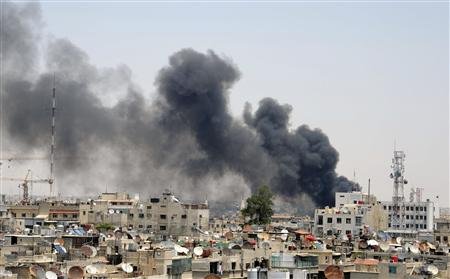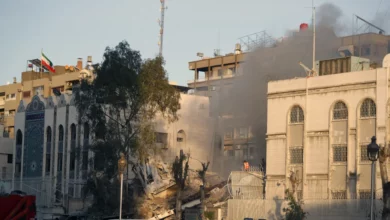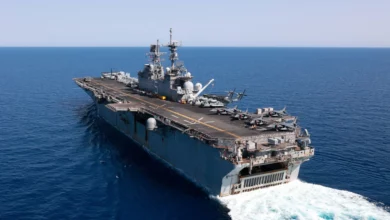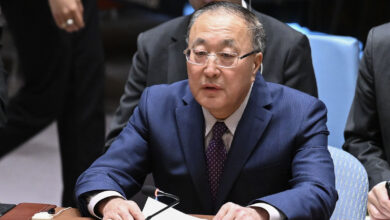
A suicide car bomb killed at least 15 people and wounded 53 in the main business district of Damascus on Monday in what the Syrian prime minister said was a response to army gains against rebels around the capital.
The bomb near a school in the Sabaa Bahrat district, which also houses the Central Bank and Finance Ministry, set cars ablaze and damaged buildings, state television footage showed.
A Damascus resident who described the blast as the biggest she had heard in the capital during the two-year-old revolt against President Bashar al-Assad said large plumes of black smoke were rising from the Sabaa Bahrat district.
Car bombs and attacks on civilians are commonplace in the Syrian conflict, which the United Nations estimates has killed more than 70,000 people, without so far producing a winner.
Each side has accused the other of using chemical weapons, among other breaches of international law, although it remains unproven whether such weapons have actually been fired.
UN Secretary-General Ban Ki-moon said an advance team of experts had gone to Cyprus and was awaiting permission from the Syrian government to investigate the conflicting assertions.
After the car bomb blast, Syrian television showed footage of seven bodies in the street, including at least two charred corpses in the wreckage of an overturned bus. Other vehicles were still on fire, lined up in what appeared to be a car park.
A woman with a blood-covered face was carried away on a stretcher. Panic-stricken women in long black dresses and headscarves ran towards the scene. Some children in school uniform were shown in bandages.
The state TV presenter described the attack as unprecedented and said: "We only have one choice, either win or die."
Angry and terrified residents interviewed by the channel called for decisive army action. "Look at Damascus. Is this Damascus? Look what is happening to it," said a weeping man.
There was no immediate claim of responsibility for the attack, but each side blamed the other.
Russia said the blast occurred about a kilometer from the Russian embassy and that Moscow "decisively condemns the latest cruel foray by terrorists whose criminal activity is killing and causing suffering among peaceful people.”
A Russian Foreign Ministry statement said the bombing was the second major "terrorist act" near the embassy in about six weeks, "which creates a real danger to the lives and security of its employees.”
It said "extremist groups in Syria that resort to terrorist explosions and mortar attacks on residential areas must receive a consolidated and uncompromising rebuff from all members of the international community.”
Government offensive
Syrian insurgents based in the outskirts of Damascus have pushed into areas near the government-held heart of the city, stepping up mortar and car bomb attacks in recent weeks.
But rebels said the army had intensified attacks on villages in the rebel-held Ghouta area to the east of the city since mid-March, besieging some of them under siege to pin rebels back.
"The entrance of Ghouta from the north is under siege," said a rebel commander in the area. The military, he said, was trying to disrupt rebel preparations for a "big battle" to break into central Damascus, the seat of Assad's power.
Osama al-Shami, an activist from southern Damascus said Assad's forces had launched a big tank-led assault on eastern Ghouta from the side of the International Airport to the south.
If successful, he said, the offensive would dislodge rebels from their footholds around the airport and cut their supply line to eastern Ghouta from the southern border with Jordan.
Syrian Prime Minister Wael al-Halqi said on state television that Monday's bombing was a response "to the great achievements of the Syrian army, especially in the Damascus countryside."
He said the Syrian army was "determined to go forward and will crush them,” referring to Assad's foes.
In the divided northern city of Aleppo, where a military stalemate has lasted for months, government troops took the outlying village of al-Aziza, which sits next to the main highway and near the airport, opposition activists said.
They said the capture of the strategically important village could allow the army to push on into districts captured by insurgents in the south of the Syria's biggest city.
Syria's conflict started with peaceful protests against four decades of Assad family rule that were violently suppressed. An armed struggle ensued, forcing more than a million Syrians to flee abroad, and displacing millions more inside the country.
UN chief Ban, who met the head of the global chemical weapons monitoring body in The Hague on Monday, said the UN investigators only needed a green light from Damascus.
"We are ready," he said. The full team will consist of 15 experts, including inspectors, medical experts and chemists.
"All we are waiting for is the go-ahead from the Syrian government to determine whether any chemicals weapons were used, in any location," Ban said. He urged the Syrian government to be more flexible so the mission could deploy as fast as possible.
Syria has asked the United Nations to investigate an alleged chemical attack on Khan al-Assal village, near Aleppo, on 19 March which it blames on insurgents. The opposition, which says the government was behind the attack, wants the UN team's remit to include other alleged chemical attacks in Damascus and Homs.
Western powers back the opposition stance, but Russia has resisted broadening the UN inquiry. Ban said all serious claims about chemical weapons use in Syria should be examined.
"The use of chemical weapons by any side, under any circumstances, would constitute an outrageous crime with dire consequences and constitute a crime against humanity," he told delegates to a chemical weapons conference.




